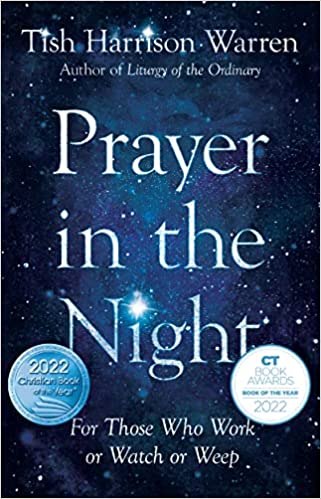I am looking forward to beginning our study of Rev. Tish Harrison Warren’s book Prayer in the Night: For Those Who Work or Watch or Weep. For this week, please read the Prologue and Chapter 1: “Finding Compline: Nightfall.” If possible, try to be still and quiet the mind before beginning the reading.
Rev. Warren writes her book explicitly from the first-person perspective. Of course, most Christian study books are written from the author’s opinion of the Scriptures or an element of Christian doctrine based upon their knowledge and understanding. For example, in our prior study of the parables, Robert Capon gave us his understanding and interpretation of Jesus’ parables as contained in the gospels. Here, however, Rev. Warren is not so much giving us the benefit of her education or knowledge or opinion, but the benefit of her personal experience in walking through a very dark time. And throughout her book, she will give us a brutally honest account of this experience of walking through this darkness in faith.
The Darkness:
The book begins with Rev. Warren covered in blood in an emergency room in Pittsburg in January. She had just moved to Pittsburg less than a month previously from Austin, Texas, and her father died only a week after the move. In a new city far from home, she began to miscarry her pregnancy. At night at dinner at a new acquaintance’s home, she begins to hemorrhage. As she is waiting on a gurney in the emergency room, she demands her husband to pray Compline with her.
As she tells us, she demanded to pray Compline because she could not find the words to pray for herself. The words of Compline prayed for her when she was unable. Further, as she tells us, she needed to pray for something more than a simple healing of her medical condition. Rather, she wanted the reassurance of God’s goodness. “I had to decide again, in that moment . . . with my baby dead and my body broken, whether those things I preached about God loving me and being for me were true.” p.7. She was desperate to know God, not in a way so she could write a seminary term paper or a bible study email, but to know God enough to hold on to her “own frailty, vulnerability, and weak faith – a truth as deniable as it is definite.” p.7.
Faith:
For Rev. Warren (and for most of us), all of our prayers echo the prayer of the father of the demon-possessed boy in Mark 9: “I believe, help my unbelief.” Mark 9:24. p.8. She writes that her faith is more of a craft than a feeling. It is a craft that she practices primarily through prayer. But, as she explains, faith is not a work, but only comes as a miraculous gift.
The greatest gardener cannot make the daffodils grow – that requires a miracle. Rather, the gardener, in exercising his craft, merely participates in the mystery of life. The gardener takes up his craft, on good days and bad days, and waits for the mystery to occur. As she writes, it is here “in our deepest moments of anxiety and darkness, we enter into this craft of prayer, at times trembling and feeble.” p.9. It is prayer that shapes us and changes us and tells us what to believe. It is through prayer that we exercise our craft of faith.
She ends her prologue with the cry that “as I prayed that night, I wanted to believe the things I proclaimed: that God knew and loved me, that this terrible moment, too, would be redeemed. I believed it and I didn’t. Reaching for this old prayer service was an act of hope that it would put me under the knife, work in me like surgery, and set things right in my own heart.”
Questions to Consider:
In the back of the book (pp.176-87), Rev. Warren gives us specific discussion questions and suggested practices. The questions for the prologue are as follows:
1. Can you think of a time of emergency, anxiety, or vulnerability when a passage of Scripture, a song, a prayer, or a practice came to you? If you have a story like that, share it with your group or journal about it. How did it make you feel when you entered into those words or that practice?
2. The author says, “Faith, I’ve come to believe, is more craft than feeling. And prayer is our chief practice in the craft.” What are the implications of faith being like a craft? How would that change how you approach worship and prayer?
Dinner begins at 6. The menu is Pennsylvania Dutch New Year (pork and sauerkraut). Discussion about 6:45. Compline at 8. Hope to see everyone here.
Keep watch, dear Lord, with those who work, or watch, or
weep this night, and give your angels charge over those who
sleep. Tend the sick, Lord Christ; give rest to the weary, bless
the dying, soothe the suffering, pity the afflicted, shield the
joyous; and all for your love’s sake. Amen.
1979 BCP 134


Pingback: Prayer in the Night – Keep Watch, Dear Lord: Pain and Presence, pt.2 – Ancient Anglican
Pingback: Prayer in the Night – Those Who Weep: Lament pt.2 – Ancient Anglican
Pingback: Prayer in the Night – Those Who Watch: Attention – Ancient Anglican
Pingback: Prayer in the Night – Give Rest to the Weary: Weakness and Silence, pt.2 – Ancient Anglican
Pingback: Prayer in the Night – Shield the Joyous: Gratitude and Indifference – Ancient Anglican